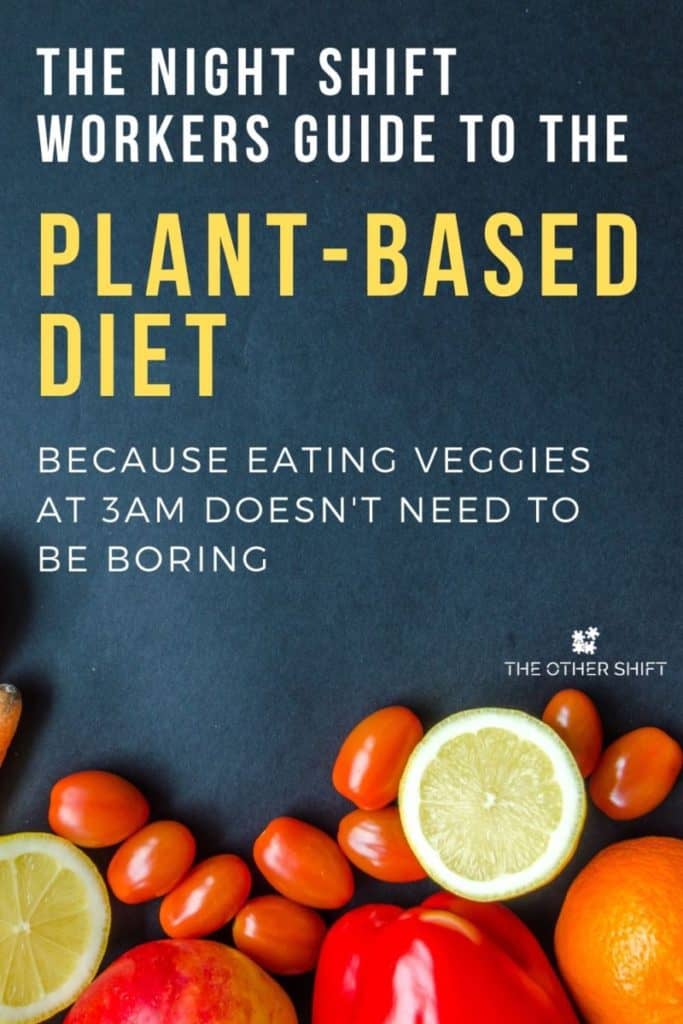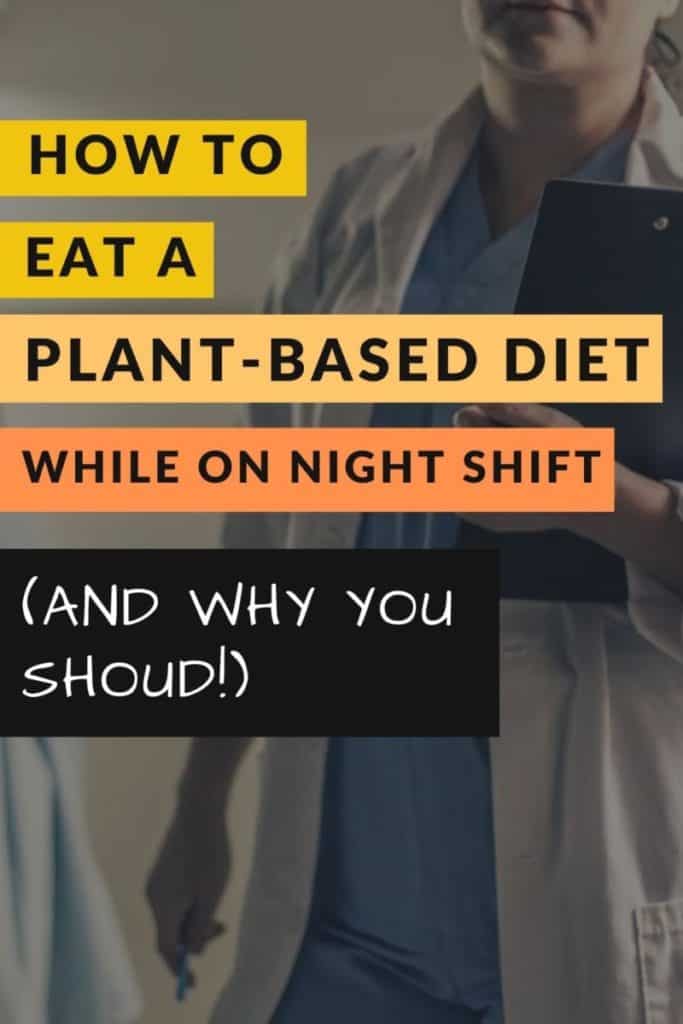Vegan, flexitarian, vegetarians, nordic, ornish, pescatarians, Lacto-ovo vegetarian, beegan… It seems that everywhere you look another diet or way of eating is being created or simply modified to be given a new hipster name. But what about the plant-based diet? Eating more fruits and vegetables is by no means a new fad diet so why is it dominating our news feeds and conversations? I was interested to see how we, as night shift workers, could benefit from this “diet” and what food choices we can make in the wee hours of the morning.
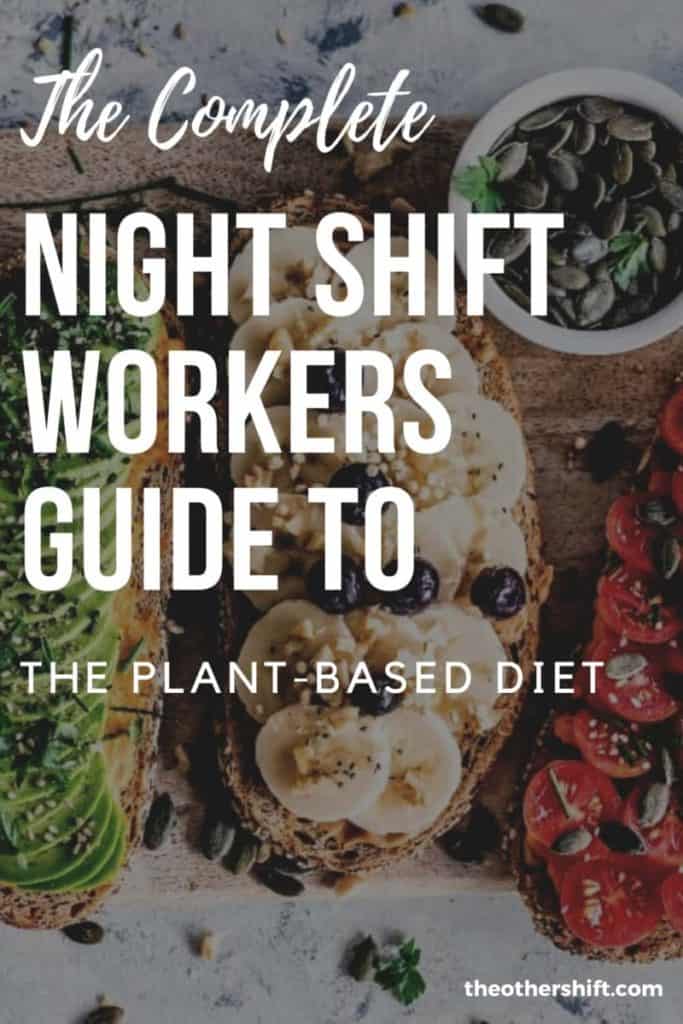
Making the switch to a plant-based diet could be challenging for fatigued night shift workers, who are often drawn to foods of convenience. But by making small changes, like dairy-free milk in your coffee or eating more vegetables and fruits, can make a huge difference to your health and risk of chronic disease often impacting 3rd shift workers.
When you work the night shift, what do you pack in your lunch box to eat whilst on break? Do you bring anything at all from home or instead rely on the vending machine and gas station across the road? Or do you try and be healthy meal prepping a few days ahead, making sure you consume all the healthy recommended food groups?
Until now, eating exclusively plant-based foods has NEVER been something I’ve packed into my lunch box and to be honest, even considered. I’ve grown up eating eggs, meat and dairy and have never pictured a life without these foods. But as I’ve learnt more about the risks of working against our body clocks and seeing the crazy benefits people are experiencing when eating primarily plant-based foods I started to take notice.
This post explores my understanding of the plant-based diet and how I believe it can change the lives of struggling night shift workers.
What Is The Plant-Based Diet?
The plant-based diet is one that focuses on plant-based, whole foods which are natural and have been minimally-processed.
The word whole foods mean ones that are unrefined or contain minimally refined ingredients.
Whereas the word plant-based means food that comes soley from plants and doesn’t include animal ingredients such as honey, meat, milk and eggs.
“Plant based diets are high in fiber, complex carbohydrates, and water content from fruit and vegetables. This may help to keep people feeling fuller for longer and increase energy use when resting”.
medicalnewstoday.com
Popularity Growth
Eating plant-based foods may seem like a new fad to some but in fact, it’s been around for decades. The modern-day vegan movement began in November 1944 when six non-dairy vegetarian pioneers met to discuss non-dairy lifestyles and diets and it has grown in popularity ever since. (source)
But for me, it wasn’t until recently that the possibility of skipping meat and dairy consistently was seriously considered. But why was this?
Was it the celebrates like Bill Clinton, Beyoncé and Jay-Z who publically announced they were eating only plant-based foods that made us consider what we are eating? (source)

Or was it because of Netflix, who produced insightful documentaries like Folks Over Knives and Game Changers, who made results of tireless research studies completed in laboratories available to the masses?
Or is it the effects of climate change reported by passionate people like Greta Thunberg and Leonardo DiCaprio forcing us to take this way of life seriously?
Whatever your reason, read on to discover how eating more plants and less (or zero) animal products may boost your health as a night shift worker and were to start.
Difference Between Vegan and Plant-Based diet
| Vegan | Plant-Based |
| Vegans avoid all animal products. This not only includes food but also animal products found in shoes, clothing and any other aspect of their lives. | The plant-based diet eliminates or minimizes all animal products. Cutting back on animal products is seen, but maybe not entirely. There are no restrictions about wearing or using animal products. |
| Vegans do not necessarily focus on whole plant foods; they may eat refined and processed foods, although many choose not to. | Highly refined foods are to be avoided. |
“Even though a vegan diet can certainly be a healthy one, experts say a plant-based diet has one nutritional edge: It usually encourages eating more whole foods and avoiding processed picks. Processed and packaged foods can still be vegan–and not-so-nutritious, like vegan ice cream or cookies”.
Health.com
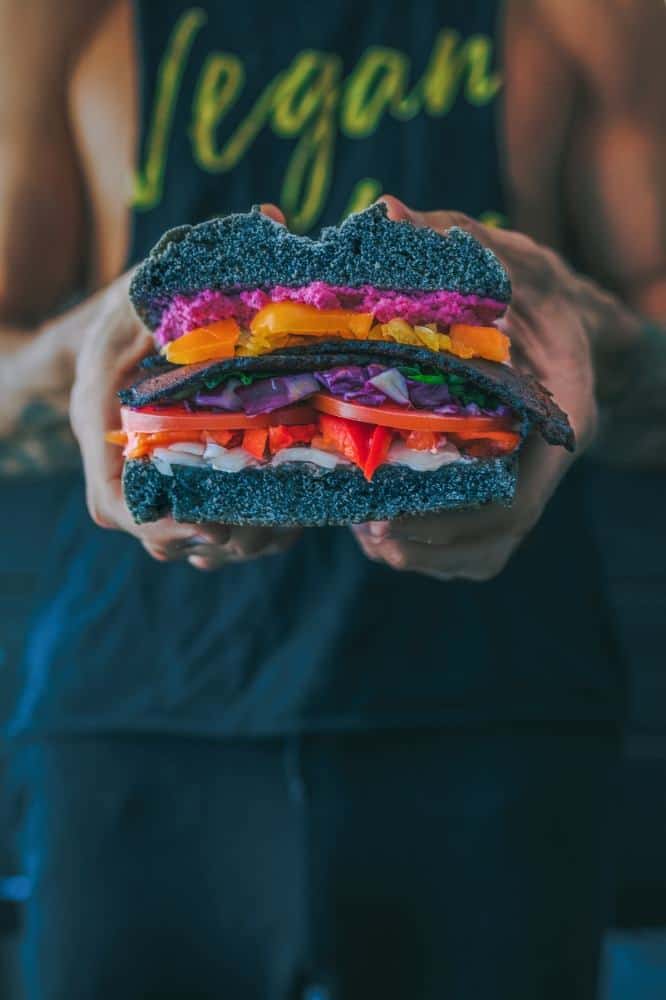
What Foods Can I Eat On the Plant-Based Diet?
Fruits
Any! Apples, bananas, grapes, strawberries, citrus fruits, etc.
Just keep in mind as night shift workers, some fruits like apples cause more bloating during the shift as our digestive system is “resting.” Read more here – Night Shift Tips and Tricks.
Vegetables
Any! Peppers, corn, avocados, lettuce, spinach, kale, peas, collards, etc. You can also get stuck into eating tubers. These are the root vegetables like potatoes, carrots, parsnips, sweet potatoes, beets, etc.
Again, bloating is often a common complaint seen in the night shift working community. Steaming veggies rather than eating them raw can help feeling (and looking) like you are 35 weeks pregnant. We have a few posts regarding bloating and nausea on night shift I recommend you check out below:
Whole Grains and Legumes
Like popcorn (without smothering it in melted butter), grains, cereals, quinoa, brown rice, millet, whole wheat, oats and barley.
In terms of legumes, beans of any variety, lentils, pulses, and similar ingredients are all part of this diet. Again, watch out for the beans on night shift, as your poor digestive system could get thrown into overdrive.
Others…
- Nuts
- Most hummus dips (I look for the vegan symbol)
- Seeds
- Tofu
- Tempeh
- Whole-grain flour breads and wraps
- Plant-based milk
- Maple Syrup (most varieties)
A Typical Night Shift Workers Shopping List Could Look Like This:
- Instant brown rice (check out the vacuumed seal varieties) or bagged brown rice to save money
- Unsalted canned beans – all varieties
- Unsalted canned chickpeas
- Unsalted canned tomatoes
- Legumes
- Whole grains such as quinoa and oats
- Whole-grain crackers and whole grain bread/wraps (great for pizza!)
- Whole wheat pasta and brown nice
- Frozen vegetables and fruit
- Frozen soups
- Dried fruit (for baking and seasoning)
- Almond butter
- Raw almonds
- Salt-free spice mixes
- Dairy-free milk
- Fresh fruits/vegetables

Benefits of Eating a Plant-Based Diet for Night Shift Workers
We recently published a post titled, Is Night Shift Bad for You? 11 Truths Uncovered which revealed some pretty scary stuff night shift workers are at risk of due to working against our body clocks. I urge you to check out this post to gain a better understanding of what is actually going on when we sleep, eat and live during the night.
Can I guarantee that eating a plant-based diet will totally eliminate these risks of chronic disease for night shift workers? No, I can’t. But the research undertaken is promising in at least reducing our chances of getting sick and even living a healthier life.
Benefits of Eating a Plant-Based Diet for Night Shift Workers:
- More Energy
- Weight Loss
- Reversal of Heart Disease
- Removing the Diagnosis of Diabetes
- Decreased Risk of Chronic Disease
- Money-Saving
- Quicker Recovery After A Workout
- Less pain and Bloating
- Animal and Environmental Benefits
Let’s explore each one.
More Energy
Working against our body clocks causes us to be incredibly fatigued when we don’t get enough sleep, right?
We often feel fatigued at work leading us to drink more and more coffee and consume copious amounts of sugar for the “hit” we so desperately need to stay awake.
Eating a plant-based diet can naturally boost energy levels as your blood sugar levels remain more consistent throughout the day/night without the need for x10 coffees. (source) Plus, fruits and vegetables are naturally full of energy-boosting nutrients.
Weight Loss
Do you seem to put on weight when working nights? I know I have.
Eating a plant-based diet can lead to significant weight loss and a leaner physic when you check yourself out in the mirror or when putting on a pair of stiff jeans on your days off. (source)
The evidence and stories about weight loss seen when animal-based foods are removed from people’s diets are phenomenal. Check out this post to reveal a bunch of research done on weight loss in regards to eating a plant-based diet.
Watch out this interesting YouTube video for more information about weight loss when eating plant-based foods.
“Starchy foods keep you full and satisfied, so you’ll naturally eat less of the animal products and processed foods that are making you sick.”
Dr. McDougall from Forks Over Knives
Weight loss without calorie counting…
The cool thing about eating this diet is you don’t need to calorie count to still lose weight. (source) Because of the nutrient density of whole plant foods, counting calories is not really necessary to shed weight if you stay within the plant-based diet.
I personally found I have lost weight simply by eating less. I seem to become fuller much quicker when eating more veggies, which also stops me from overeating at night.
Related posts:
- Graveyard Weight Loss: Shift Workers Guide to the Keto Diet
- Should I Eat on Night Shift? Why Intermittent Fasting Works
Reversal of Heart Disease
Research has found that eating a plant-based diet not only improves blood pressure but it also reversed existing heart disease. (source)
Again the evidence here is simply fascinating. People (some, not all) who switched to this plant-based lifestyle were able to stop taking their medications for blood pressure and heart disease.
According to the Physical Committee, “A new research report confirms that heart disease can be dramatically improved—and even reversed—by a plant-based diet”.
Though this may not be the case for everyone who switches to a plant-based diet, the results some people are experiencing is promising, even for us who are at a higher risk of heart disease.
Removing the Diagnosis of Diabetes
Night shift workers are at a higher risk of being diagnosed with chronic diseases, such as diabetes, due to our almost magnetic draw to sugars and unhealthy foods high in fat.
We crave anything that helps keep us awake! aka… sugar!
However, eating a plant-based diet can stabilize our blood sugar levels leading to more sustained energy.
“A plant-based diet is a powerful tool for preventing, managing, and even reversing type 2 diabetes”.
Source
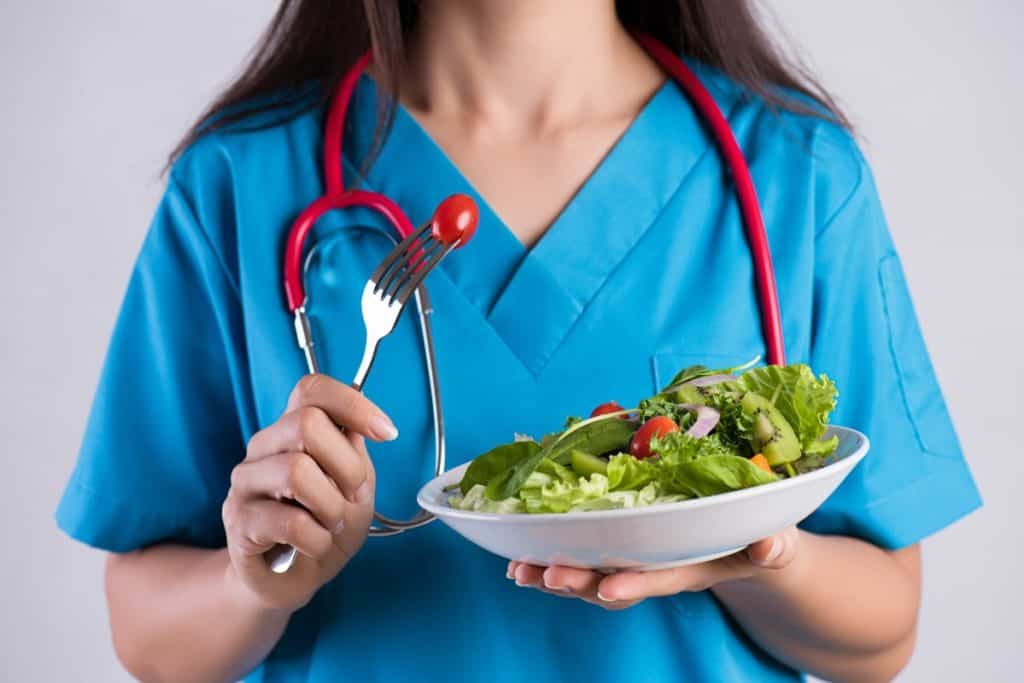
Decreased Risk of Chronic Disease
Like diabetes, eating a plant-based diet can help reduce the symptoms and even eliminate diseases such as glaucoma and kidney disease.
In particular, this woman experienced two scary blackout episodes and started eating a plant-based diet after. Since commencing on this diet she hasn’t had a blackout since… and lost 100 pounds!
This guy went from having 3% kidney function and being on regular dialysis to keep to him alive, to now being dialysis-free.
The Physicians Committee, even stated that erectile dysfunction could be cured with eating a plant-based diet.
Interestingly, the risk of cancer was also reduced when eating a plant-based diet – another thing night shift workers are at risk of. After reading through numerous reports it seems that cancer isn’t always part of the gene pool as we are often lead to believe. (source)
Money-Saving
How much money are you spending on sleeping pills and prescribed medications? I’m guessing a lot.
How about health insurance and doctor’s visits?
I currently take cholesterol tablets as doctors have always told me “it’s genetic”, basically meaning I can’t do anything about it. My goal is to get off these tablets for good with the help of the plant-based diet.
Eating a diet rich in more fruits, vegetables and whole grains may help you sleep better (source), become sick less often and take fewer medications meaning less money spent in the pharmacy and medical clinics.
“He who takes medicine and neglects diet wastes the time of the doctor meaning quotes”
Chinese Proberb
Quicker Recovery After A Workout
If you do manage to go to the gym between night shifts, how sore are you the following day? I find that when I’m tired my muscles take significantly longer to recover.
Research studies with UFC athletes have concluded that those eating a plant-based diet recovered quicker than if they stuck to an animal-based food diet. (source)
So, if you’re spending 12+ hours on your feet as a busy medical professional or factory worker, you may find you feel less fatigued when eating plant-based foods.
Less Pain and Bloating
Nausea and bloating have almost become an expected and accepted part of night shift. But they don’t have to be. I personally have experienced less bloating, stomach pain and reflux when eating on night shift after starting to focus on plant-based foods.
Though it took a little while to get used to, I found a few recipes which are now my “go-to” and it makes eating these foods on night shift a breeze.
We have written two posts, one about night shift bloating here and the other about night shift nausea here which aim to educate night shift workers on how to avoid these annoying digestive issues.
Animal and Environmental Benefits
Then there is, of course, the animal and environmental benefits which are often people’s drivers to starting this diet.
“Livestock are one of the most significant contributors to today’s most serious environmental problems,”
“Urgent action is required to remedy the situation.”
United Nations (source)

What About Protein for Night Shift Workers?
I have always grown up with the idea that meat has more, much more protein than plants. This is why we have been trained to eat meat every single day and pretty much during every meal to build muscle.
It wasn’t until recently, embarrassingly as a nurse, after watching the Netflix documentary, Game Changers, I realized plants could actually offer us much more protein than what I had ever given them credit for.
The documentary explores the lives of ultra-endurance athletes and Ultimate Fighters in the UFC (Mac Danzig is one example) who have adopted a plant-based diet. The results were utterly incredible. Big, strong men eating no meat, competing on the world stage – and winning!
It sparked my interest to say the least, but not quite enough to make huge changes at the time.
But I started to think…
Do vegans and those on a plant-based diet eat enough protein?
Well, according to Dr. Michael Greger from Folks Over Knives he says absolutely!
The average recommended intake of protein per day is 42 grams (source) and meat-eaters or non-vegetarians eat almost 80 grams.
Vegetarians and vegans “actually average 70 percent more protein than they need every day (over 70 grams)” (source) and 97% of all Americans are getting enough protein – meat eaters or not. (source)
But what I found really fascinating as I was reading and watching plant-based information was actually America’s lack of eating enough fiber.
Most Americans are eating around 15g grams a day when we should be eating 30g. By most, I mean only about 5% of the population meets the recommendations.
To me, this a big problem. (source)
By not eating enough fiber we risk worsening heart health, stroke, high blood pressure, certain digestive disorders, obesity and diabetes which night shift workers already have an increased risk (see our post on why we are so bloated all the time and how to fix it here). (source)
So what’s that got to do with eating plant-based foods?
Well, fiber is ONLY found in plants and is not found in meat, eggs or dairy.
So what can we do about it? Eating more fiber in the form of grain products, vegetables, legumes and fruit will boost these numbers significantly and better your health.
High fiber foods: (source)
- Strawberries
- Avocado
- Apples
- Raspberries
- Bananas
- Carrots
- Beets
- Broccoli
- Kidney Beans
- Popcorn
Eating more fiber success tip:
When looking to eat more fiber, go slow. Don’t increase your amount by any more than 5g per week.
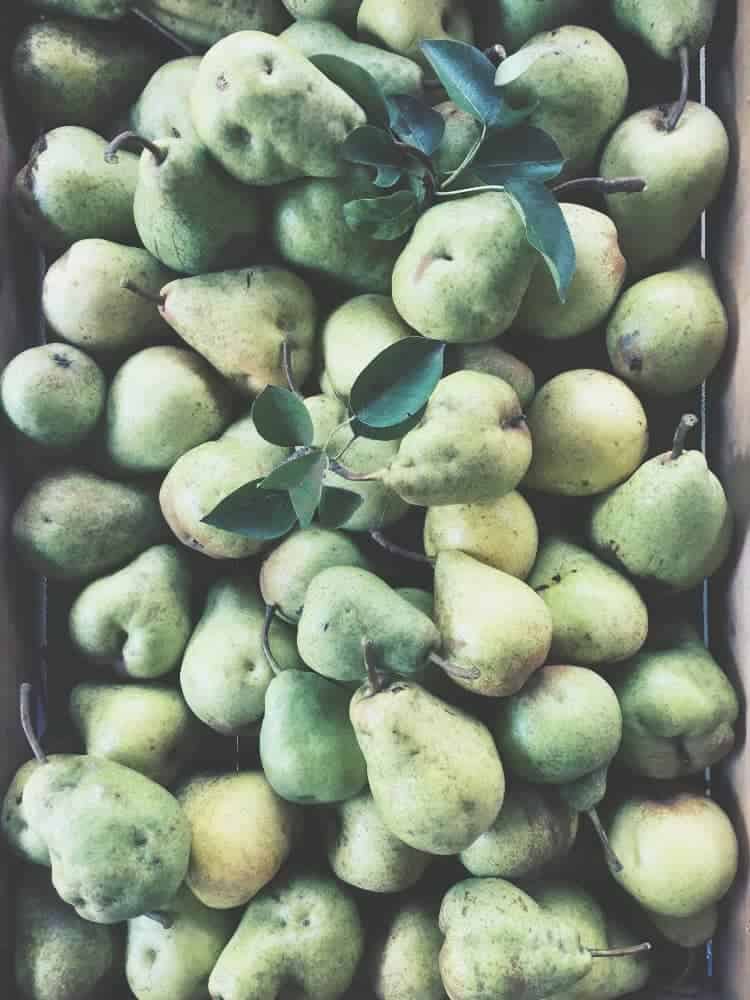
5.5 grams in a medium-sized pear, or 3.1 grams per 100 grams (source
 ).
).Don’t We Need Dairy For Calcium and Strong Bones?
We grow up believing that the only way we can get strong bones is to drink milk, right?
Well, there is a ton of calcium in foods such as spinach, bok choy, cabbage, turnip and kale, who can do an even better job creating strong bones. (source) Couple that with regular exercise, especially weight-bearing and muscle-strengthening exercises and you’re well on your way to being the next Arnold Schwarzenegger. (source)
You’d think a country where high volumes of cows milk is consumed would mean very small amounts of bone-related issues, like osteoporosis, right? Countries like Norway and America for example? Well, the direct opposite is seen in the research. (source)
Animal protein, such as cows milk, tends to create an acid like condition in the body called metabolic acidosis. (source) To normalize and “equalize” this environment the calcium, which is kept in our bones, moves out into the body. This causes the bones to become weakened resulting in fractures and broken bones.
The bottom line is, we don’t need to drink cows milk in order to consume the right amount of calcium.
Here are some foods high in calcium you should consider adding into your night shift lunch box:
- Brussel Sprouts
- Collard Greens
- Kale
- Sweet Potatoes
- Chickpeas
- Navy Beans
- Soy Beans
- Tofu
- Dried Figs
- Fortified Milks
[VIDEO] – Interesting video about calcium on a plant-based diet
But Buying Healthy Foods Are Expensive!
I’ve found it’s almost cheaper for a night shift worker to pick up takeout after a night shift over buying a packet of oatmeal and some fruit.
Only this morning I drove past Burger King who was offering a deal of 5 items for $4. It’s no wonder night shift workers are taking this easy and convenient option, particularly when tired from a long shift!
But we can’t simply give up because we assume eating a plant-based diet will burn a hole in our financial situation.
Here are some options for saving money when eating a plant-based diet which have worked for this hard working shift crew;
- Instead of buying the individual, vacuum-sealed, microwavable bags of rice and quinoa together, (though still have a few in the pantry for emergencies), cook up a huge batch at the beginning of your week and stick it in the fridge. It will save you a ton of money.
- When grocery shopping, don’t simply buy the “on-sale” items at the end of the aisle. There will likely be cheaper alternatives down the isle, though maybe not at eye level. Buying “store banded” items can make shopping cheaper too.
- Buy “in season” fruits and vegetables and don’t forget about frozen items too.
- Try visiting the farmers market on your days off or before your first night shift. If you have no idea where these markets are, google “local Harvest“… this website is pretty amazing.
- Visit the “bulk section” part of the grocery store and have some fun. Choosing dry beans instead of canned beans can save you a ton of money (and sodium intake!) when soaked at home. Though I know the inconvenience of this may turn some of you away.
- Join a CSA
 (community supported agriculture) program that offers members with regular (usually weekly) deliveries of locally-grown farm products during one or more harvest season(s).
(community supported agriculture) program that offers members with regular (usually weekly) deliveries of locally-grown farm products during one or more harvest season(s).
- When placing wholesale orders for fresh foods and vegetables, grab a few friends and order together.
- Instead of buying “organic” fruits and vegetables, make an effort to focus on whole, plant-based food. Organic foods can, though presumably less, still contain pesticide residue according to the Dietitians of Canada. So, regardless of what you buy remember to wash your fresh foods thoroughly before eating.
- Start your own vegetable garden. Even when living in an apartment. This book I found on Amazon could be very helpful! Starting a No-Fail Plans for Small Organic Garden sound pretty good to me! (ad)

Traps for Night Shift Workers Eating A Plant-Based Diet
- Not consuming enough vitamin B12
B12 is found naturally in animal products but is not found in plant-based foods. It “helps the body’s nerve and blood cells stay healthy and it plays a role in the creation of DNA, the genetic material found in all cells”. If we don’t get enough, were in trouble.
“B12 is critical to any healthy diet – and not getting enough can have devastating consequences on your health”.
Dr. Michael Greger – founder of NutritionFacts.org
B12
Whole plant foods contain all the essential nutrients we need with the exception of vitamin B12. Fortified foods such as plant-based milks and breakfast cereals are recommended or a B12 supplement like this one on Amazon.
- Disregard for Food timing
When we eat is just as, if not more important as, what we eat as night shift workers. In this post we talk about how important food timing is to not overload our resting digestive system. Take a look as this information still applies even when eating plant-based foods. This book on Amazon will help better your understanding too as it did for me!
- Potatoes
Though obviously plant-based, the nutritional value pretty much disappears when deep-fried in potato chip form. Stick to steaming, grilling or my favorite, homemade sweet potato chips for the most nutritional value.
- Buying pre-cut vegetables
As a financial trap – buying pre-cut veggies will make your hard-earned money disappear. Plus, pre-chopped foods also means increased air exposure and reduced shelf life.
- White rice
Though plant-based, white rice in highly processed, removing those heart-healthy nutrients health professions often link with this diet. Plus, they have a high glycemic index meaning we get hungry quicker leading to overeating and our blood sugar levels skyrocketing. (source) In English… stick to brown rice and quinoa. (Though if you’re exercising regularly, white rice may be okay for you).
- Drinking 100% fruit juice
We often talk about stop consuming caffeine 5-6 hours before you sleep, such as in this post here, leaving most night shift workers feeling like they have limited options. 100% fruit juice is packed with sugar and the process to make these drinks often removes the fiber and vitamins we need. Instead, pre-make a fruit smoothie and bring it to work if fridge facilities are available. If not, herbal tea or iced water work a treat for hydration and energy. See – What Should I Drink on Night Shift? 10 Energy Boosting Beverages
Success tip:
Stop caring about the appearance of packaging. Start to only take notice of what’s actually written on the nutritional label.
- Doctors
Not all medical professionals have bought into the power of the plant-based diet and may still encourage excessive medication use to “fix your problems” as a night shift worker. Just remember you are in control. Gain a second opinion when necessary.
- Not doing enough research
Before totally eliminating meats and dairy from your diet, it’s important to understand what you need to replace or eat more of to gain the same (or better) nutritional values.
“Many vegetarians and vegans make the mistake of eliminating but not correctly replacing,”
Dr. Brandi Jouett-Patrickson – Piedmont Physicians Group. (source)

Traveling Night Workers and Eating Plant-Based Foods
Truck drivers, traveling nurses and particular members of the police force cannot simply pull open the fridge and grab their plant-based meal whilst on break, so what options are available?
Here are some ideas when traveling for work and sticking to a plant-based diet:
- Bring your own meals in a freezer bag/insulated lunch box like the one we talk about in the essentials night shift tools here. Pre-pack trail mix, veggie sticks, plant-strong burritos or sandwiches and pack them inside the cooler.
- When filling up at the gas stations choose whole-grain pretzels, fresh fruit or unsalted nuts.
- Homemade and packaged soups and vacuumed sealed rice works for those with access to a microwave at a pitstop area.
- When at Starbucks, choose their oatmeal – it’s yum!
- Find a whole foods grocery store/big gas station or even a Kroger and make your own go-to salad for the road.
Success tip:
Buy a cheap can opener and a set of utensils, such as the ones we list on our shift work tools page here and always keep it in the car for emergencies.

Eating Out on a Plant-Based Diet
Looking to venture out on a day off or after a night shift for breakfast?
Below are some popular cuisines and how you can modify your choice when the waitress/waiter asks for your order. (source)
If you can’t find anything suitable on the menu don’t be afraid to ask. Most restaurants will be very accommodating and even excited they get to create something different.
American/Steakhouse:
The smell in these places makes changing habits here difficult – but not impossible.
Instead of the ribs, order a potato (I choose sweet potatoes as I prefer the taste), lots of steamed veggies and a huge salad. Balsamic vinegar is a great dressing or try sneaking in your own such as one of these six delicious ones I found on YouTube.
Italian:
Choose the whole grain pasta and tomato sauce options and don’t be afraid to ask if you can’t find it on the menu. Also, ask them to toss in as many steamed/grilled vegetables as they can find!
Some restaurants may have “vegan cheese” which I NEVER thought I’d eat but it’s actually not too bad.
Want pizza? Though it might be difficult to find, ask for a whole-grain pizza crust without the cheese and instead loaded with grilled vegetables.
Asian:
One of my favorite cuisines! When ordering or choosing sushi from the case, ask for brown rice and have steamed not fried vegetables or tofu.
Vegetable sushi is a great snack whilst on nights! Watch out for the sauces though, like the delicious “yum yum” sauce, and choose low-sodium soy instead.
Cafes and Breakfast Hot Spots
The cafe “brunch” scene in my hometown of Australia is ridiculously popular. Eggs, bacon, salmon with chorizo was a personal favorite of mine, but I used to suffer horrible bloating, fatigue and stomach pains for hours after.
So if you’re like me and are trying to make a change, order oatmeal made with water or plant-based milk (not cows milk) trickled with some fruit and nuts.
If you’re not “feeling oatmeal” as you’re looking for something different to your every day, ask if they have whole-grain bread, a little nut butter, and some fruit.
What about the coffee?
As for the drinks, hot herbal tea is a great option and is recommended by health experts in the plant-based diet space (source). But if you’re a night shift worker who needs some caffeine, like a fair chunk of us, there are varied opinions about it being okay on the plant-based diet.
It seems that what’s important about drinking coffee is what you are putting in it. The sugar, creamer, milk, whipped cream…
…I thought that the two main food groups were caffeine and sugar”
Dr. Pam Popper – Executive director of the Wellness Forum – Colubus Ohio
As a night shift worker, I know our addiction to coffee and caffeine is real. You don’t have to look very far when walking onto a shift to see pretty much every nurse holding a tumbler full to the brim with coffee – and it’s likely not their first one!
When switching to a plant-based based diet or even looking to implement a little change first, simply remove the milk. Stop adding creamer and adding extra sugar. Instead, use plant-based milk, like cashew milk or almond milk and add maple syrup. Be on the lookout for vegan varieties too.
I know this will be difficult for a lot of you but making little changes first will help build momentum.
Success tip for eating out:
Check out the Vanilla Bean App and HappyCow app to find all the vegan-friendly restaurants near you. (source)

Ready to Start Eating A Plant-Based Diet…slowly?
I love this quote.
“think of meat as an accent to the meal instead of the star of the plate”
Harris-Pincus (source)
Any changes you can make are positive changes until you build up to eating almost exclusively plant-based foods.
I still struggle with eating out, going to my parent’s and in-laws house for dinner and often with condiments, but I’m improving every day.
I once heard in a YouTube video somewhere to “not sweat the small stuff” and instead focus on the big changes like eliminating meat instead of the small stuff like condiments for the most measurable improvements to our health.
I created the quick table below so you can see where some easy changes can occur within your current diet.
| Current Diet | Plant-Based Diet |
| White rice | Brown Rice or quinoa |
| White Bread | Whole-grain bread |
| Processed cereal | Oatmeal made with water |
| Fruit Juice | Freshly squeezing juice, water or herbal tea |
| Cows Milk | Almond, oat, soy or cashew milk |
| Milk based coffee with creamer and sugar | Long black coffee (with/without dairy free milk) |
“A moderate change in your diet, such as lowering your animal food intake by one to two servings per day and replacing it with legumes or nuts as your protein source, can have a lasting positive impact on your health”
Dr. Satija
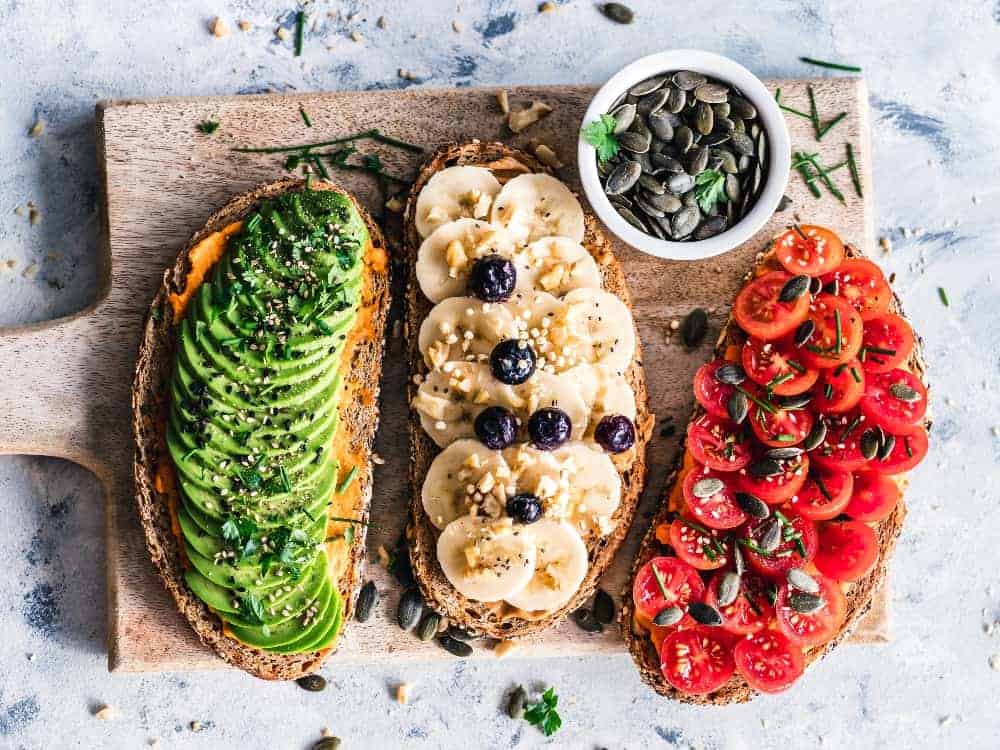
Recommended Books and Plant-Based Resources:
- Forks Over Knives App – Download it here
Summary: Complete Guide to The Plant-Based Diet For Night Shift Workers
Transitioning to a plant-based diet for night shift workers will take some adjusting.
I don’t like eating cold salads at 1am so I needed to find healthy soups and plant-based meals that can be heated to keep me interested.
Find what works for you.
Remember to not stress about the small things like sauces and even honey and instead swap out the big things like meat, white rice, and dairy products.
I’m excited to see the vast, dramatic improvement in your energy levels, weight and bloating as night-shift workers!
Have you tried eating a plant-based diet at night? What are your tricks to sustainability?
I hope this post was helpful.
Cheers,
Emma


